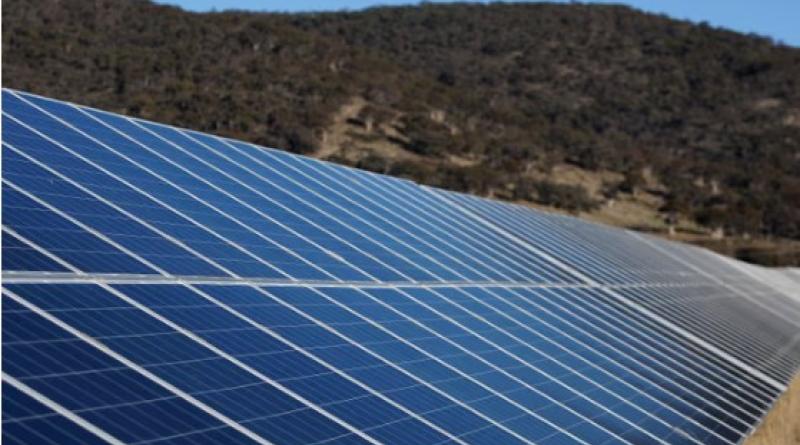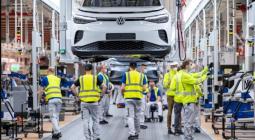The right is firing misinformation bullets in its climate war on renewables – here’s a way to fight back

In the disinformation age it’s not enough for us to shake our heads about the lies the other side perpetrates
Fresh from dragging an invitation for reconciliation into a mire of racial division, the reactionary right is prepping a new community consensus to infect, recasting the transition to renewables as a reckless attack on the environment.
The Albanese government’s election mandate to achieve net zero emissions by 2050, kick-started with a rapid transition to renewables including a 43% target by 2030, has shifted the climate agenda from advocacy to action.
Its commitment to develop renewable energy zones of offshore wind, terrestrial solar and wind and a long-overdue upgrade of the energy grid to facilitate more decentralised transmission provides multiple entry points for calculated exploitation.
Peter Dutton is leading the charge, shamelessly pivoting from climate denial to saving the whales in a bid to whip up the red regions against the latte-sipping urban elites.
The playbook is crude but effective: harness legitimate community concern to percolate victimhood, confect alarming consequences of change and create straw-men alternatives to invalidate the need for action.
In this war, lies and half-truths are the bullets: windfarms stop sheep birthing, their vibrations cause cancer, they decimate birds and sea-life – whatever the claim, the onus is shifted on to the proponent to prove the negative outcome will never occur.
In his excellent Facts and other Lies, my fellow political strategist Ed Coper lays down some markers for how to respond to these types of misinformation campaigns: find a point of shared connection, “inoculate” against the fear and “pre-bunk” the outright lies.
First, the point of shared connection: instead of negating, flagging or myth-busting mistaken beliefs, Coper recommends starting with a point of agreement. This week’s Guardian Essential Report suggests that when it comes to climate, there is a lot to work with.
The vast majority of the public are onboard with the government’s active climate change agenda. Indeed, the number who think the government is not doing enough is at its lowest since we started polling this question in 2016.
And there are clear cross-partisan majorities for the following set of statements about the renewable transition, with an equally strong rejection of the case for inaction.
Rather than dismissing concerned communities as “flat-earthers” or self-interested Nimbys, it is far more effective to recognise what is driving them is an understandable concern about the wellbeing of their community.
Endorsing an appreciation of the natural environment and validating fears about the marine impact of wind turbines or the visage of power lines can then be anchored to an agreed set of values about the long-term imperative of energy transition.
From there, people can be invited to embrace a fuller notion of community wellbeing that could include local job guarantees to cheaper prices to shared initiatives such as the Goulburn community solar project.
The endgame is to make offshore windfarms and even an upgraded power grid objects of local pride, a physical expression of our commitment to future generations that are proposed – rather than opposed – by communities.
Another question in this week’s report shows that while there is general support for renewables, there is concern about specific elements of the rollout, notably the need to upgrade these energy grids to accommodate more renewable inputs.
To what extent would you support or oppose the development of the following renewable energy infrastructure?
This is where Coper’s idea of inoculation becomes critical: administering “a weakened or deactivated dose” of a virus to someone triggers the body’s immune response to produce positive antibodies.
The reality is for all the work going into renewable energy zones, few people are aware of them. The first most communities know about the work is the announcement of a consultation over a large piece of industrial infrastructure. That’s when the shock and anger sets in.
The deeper truth is that while the project of renewable energy transition may be nominally “green”, the rapid development required to meet net zero targets is a deeper share of brown that will have a material impact on the physical environment.
Rather than promising environmental nirvana, recognising upfront that there will be costs to reap the benefits of energy self-sufficiency means communities are ready for the shock of the grid upgrade or wind project when it comes.
A final tool in Coper’s kit is that of pre-bunking blatant misinformation: bringing it to public attention and undermining the messenger before it takes hold.
We know that there are powerful and cashed-up interests who see nuclear as a more profitable extractive resource than the natural elements, which – by their nature –can’t be so easily commoditised.
What better argument for communities that don’t want a development on their coast or in their hinterland than to say: there’s a clean energy alternative, which is now “small-scale”, “modular” and can be built somewhere else?
Our polling shows there is solid public appetite for nuclear and a sense that it is perceived as being cheaper than renewables, with progressive parties splits on it merits.
To what extent do you support or oppose Australia developing nuclear power plants for the generation of electricity?
Chillingly, a separate question also finds people erroneously believe that nuclear power – when factoring in both infrastructure and household price – is cheaper than renewables.
Pre-bunking the economics and safety of nuclear upfront, rather than waiting to respond to bogus industry-sponsored modelling, may well be the only way of keeping this radioactive argument out of the national bloodstream.
And it’s not just the nuclear furphy – let’s pre-bunk the whole disingenuous Liberal National party charade of caring for environment, where every decision of the past 15 years has been to privilege the interests of fossil fuels corporations over that of community. Starting now.
In the disinformation age it is not enough to shake our heads about the lies the other side perpetrates and invoke a mythical golden age of rational debate. Coper urges us to “embrace the new information ecosystem as enthusiastically as those who use it to spread their own absurd realities, or else cede it completely to irrationality and intolerance”.
Building a community-led, reality-based politics of permission for the renewable transition will be every bit as important as the decades-long climate wars that got us to this point. In fact, it is the next phase of that battle.
Peter Lewis is an executive director of Essential, a progressive strategic communications and research company
Photograph: Lisa Maree Williams/Getty Images - ‘The vast majority of the public are onboard with the government’s active climate change agenda. Indeed, the number who think the government is not doing enough is at its lowest since we started polling this question in 2016.’






